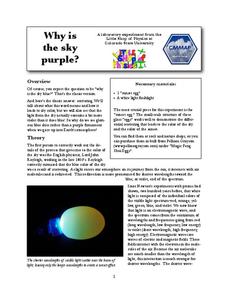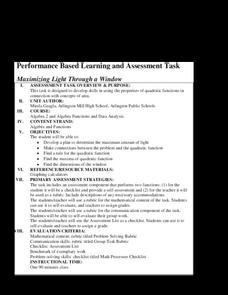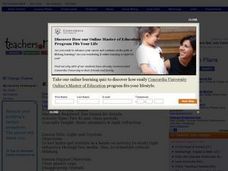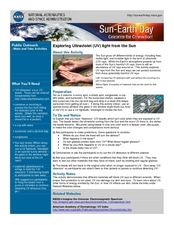Colorado State University
Can You See Beyond the Rainbow?
There's more to light than ROYGBIV! An enlightening laboratory investigation has learners explore the world of infrared light. When they use goggles that take away visible light, they experience how things look with only infrared light.
Colorado State University
Why Is the Sky Purple?
The color of the sky depends on the time of day. Young scholars experiment with scattering different wavelengths of light to recreate the color of the sky. They observe both the longer blue wavelengths and the shorter red and orange...
Cornell University
Diffraction Demystified
Study diffraction patterns using CDs and DVDs! Scholars measure the diffraction patterns of a light wave as it hits a CD or DVD. Using the information, they can measure the distance between the tracks.
Teach Engineering
Designing a Spectroscopy Mission
In this mind-bending activity, young engineers explore this question of whether or not light actually bends. Using holographic diffraction gratings, groups design and build a spectrograph. The groups then move on research a problem...
G. Turrell
Science Activity 2: Light & Sound
Little learners experiment with sunlight and map out how light travels. Using a mirror and slotted card, they find out about items that can reflect or absorb the light. They experiment with a variety of materials to find out how light...
National Nanotechnology Infrastructure Network
Understanding Wave Motion - Slinky vs. Snaky: Which Spring is Dominant?
Ride the wave to an understanding of refraction! The first in a series of two inquiry-based lessons challenges learners to create transverse waves with two different types of springs. As their wave hits an object, they observe the change...
Space Awareness
Seasons Around the World
Why does Earth experience summer, fall, winter, and spring? Using an informative demonstration, learners see how the angle of the sun on Earth and the rotation of Earth determine the seasons. Scholars work in pairs to learn that the...
Purdue University
Light – Just Right!
What does it mean to be resistant to electricity? Scholars answer the question in a six-part STEM lesson on electricity. They begin by assessing the conductivity of several different materials and progress to designing their own circuits...
ABCya
Christmas Lights Math
Get into the holiday spirit with math! As learners complete addition, subtraction, multiplication, or division problems, they earn Christmas lights that they can then use to decorate a virtual house.
Radford University
Maximizing Light Through a Window
Let there be plenty of light. For a perimeter of 10 feet, scholars determine the maximum area of a window composed of a rectangle and a semicircle. They draw diagrams and then write and solve equations to find the height and radius for...
Constitutional Rights Foundation
Prayer and Friday Night Lights? An Establishment Clause Case from Texas
Is a Christian prayer before a Friday night football game a nice gesture or the imposition of religion on the rest of the community? A resource asks the question using a clip from the popular movie "Friday Night Lights" and readings...
University of Colorado
Star Light, Star Bright? Finding Remote Atmospheres
People might be able to breath there. Learners view a simulation of a planet passing in front of a star. Using data from occultations of planets with known types of atmospheres, scholars determine whether the simulated planet has an...
Plimoth Plantation
History In A New Light: Illuminating the Archaeology of Historic Patuxet and Plymouth
Sixty-seven pages take scholars on a digital tour through the exhibit, History in a New Light: Illuminating the Archaeology of Historic Patuxet and Plymouth. Crystal clear pictures accompanied by text offer a deep understanding of the...
Smithsonian Institution
Singing for Justice: Following the Musical Journey of “This Little Light of Mine”
Scholars go on a musical journey to discover the origin, importance, and evolution of the song, "This Little Light of Mine". Class members boost their voice talents and clap to the beat while learning the lyrics in both English and Zulu....
State Library of Ohio
All the Light We Cannot See Toolkit
Anthony Doerr's Pulitzer Prize-winning novel All the Light We Cannot See is the focus of a toolkit that provides readers with a summary of the plot, background information about the author, and discussion topics.
Curated OER
Got Light!
Sources of light, and the reflection of light off of objects, are the focus of this brief and simple science learning exercise. Learners must trace the path that light takes which enables a boy to read a book. A suggested activity is to...
Curated OER
Let There Be Light
Students explore the relationship between light and color. They explore the NineColours computer program, blend colors, create a slideshow of hues of colors, and conduct an experiment using a flashlight and colored cellophane.
Curated OER
Light - Plant Science Chapter #8
A brief presentation provides notes on light for agriculture pupils. Topics covered are light quality and duration, how resulting temperatures affect crop selection, vernilization, and bolting. Even though this is titled "Light," it...
Curated OER
A Collection of Lights
The purpose of the slide show is to help learners understand that there are different types of lights, that they have an on/off switch, and that they can be made out of a variety of materials. There are quite a few nice pictures of lamps...
Curated OER
Check Out Lights and Shields with Beads
Learners explore Ultraviolet detecting beads and conduct several investigations with them. In this investigative lesson students participate in an experiment to see the harmful effects of UV light and discuss their findings.
Curated OER
Fish Tank Optics- Learning How Light Travels
Students explore light waves, refraction, and reflection. In this light lesson, students observe how light moves by using a flashlight. Students observe refraction and reflection.
Curated OER
Light & Crystals
Learners observe a demonstration of light refraction. They experiment with disappearing crystals to further study light refraction.
Curated OER
Incandescent Light Bulb
Learners study the history of the light bulb and how an incandescent light bulb works. In this electricity lesson plan students complete several experiments on the light bulb.
Curated OER
Exploring Ultraviolet (UV) Light From the Sun
Students identify the different energy given off by the sun. For this earth science lesson, students predict where the UV beads will turn the darkest color. They explain the importance of using UV protection.
Other popular searches
- Light Bulb
- Light and Motion
- Festival of Lights
- Light Energy
- Light Waves
- Light Reflection
- Light Spectrum
- Light and Sound Waves
- Lightning
- Light Sources
- Lightning Rod
- Light and Sound

























